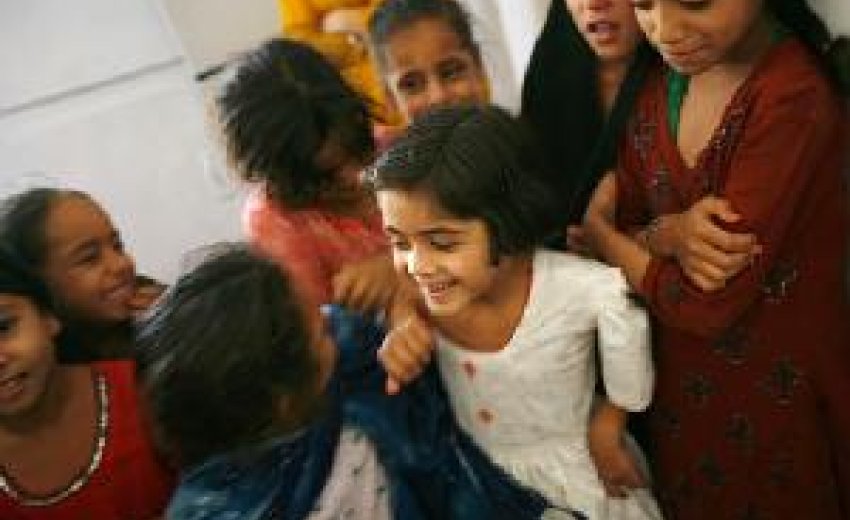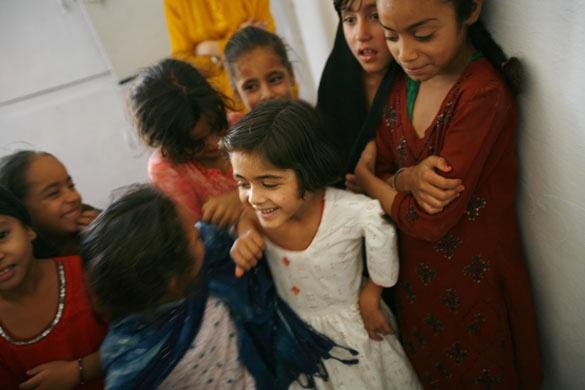Children of Sikh families displaced by fighting swim in the waters outside the Gurdwara Panja Sahib.Photograph: Declan Walsh
Flight from the Taliban has been a bittersweet experience for Darsha Singh, a turbaned Sikh farmer sitting on the steps of an ancient, glittering shrine just outside Pakistan's North-West Frontier province.
For two months he has been living at the Panja Sahib gurdwara, an ornate temple that is one of the most revered sites in Sikhism and which has become a temporary home to 3,000 Sikhs from across the war-stricken province.
It is a luxurious refuge compared with the conditions endured by most of the region's 2 million displaced, some of whom started to trickle home in military-protected convoys today.
Instead of a dust-strewn camp the Sikhs live in quarters normally reserved for pilgrims. Thanks to official and private donations they enjoy a well-stocked clinic, a 24-hour kitchen and a temporary school that bustles with laughing children.
At the shrine at the heart of the complex, the devout while away the day inside a rainbow-tiled room, perusing scripture and murmuring their prayers. Outside the door, boisterous teenagers yell and splash about in a cool, clear pool that quivers with fish, which volunteers feed diced cucumber.
But the serene atmosphere is scant consolation to Darsha Singh, who fears he may never return home.
Two months ago, long-haired Taliban fighters stormed into Orakzai, a tribal agency near the Afghan border, brandishing AK-47 rifles and bringing a harsh demand: that the area's 40 Sikh families should pay jazia, an ancient tax on non-Muslims living in an Islamic state.
To encourage the payment of 12m rupees (£90,000), they kidnapped and tortured one of Singh's neighbours. The Sikh community banded together to pay half the money, secured his release, then fled.
"The Taliban are still demanding the money," said Singh, a sprig of orange visible under his blue turban. "They recently rang me looking for the rest of the money. We are afraid they will find us, even here."
The jazia demand highlights how the Taliban onslaught has upended decades of inconspicuous social harmony between Pashtun tribesmen and religious minorities. An estimated 10,000 Sikhs live in the Frontier, where they have quietly thrived as traders, civil servants, doctors and farmers, often providing a middle-class backbone to poor societies.
They are the descendants of families that stayed behind at partition with India in 1947, protected by communities that valued them. They have become an integrated part of Pashtun society – attending weddings and funerals, even getting involved in hashish smuggling.
When fighting gripped Mingora, the capital of the Swat valley, last May, a Sikh doctor remained at the city hospital after all other staff fled. "We lived with the people like brothers," said Singh.
The arrival of the gun-toting Taliban steamrolled this precious, and little-known, sense of tolerance. When jazia was last imposed on the Indian subcontinent 300 years ago, during the Mughal empire, it was considered a legitimate tax. Under the Taliban, it has become a thinly disguised extortion racket.
The problem was greatest in Orakzai, where the Taliban razed the homes of 11 Sikhs after the community fled last May. The intimidation was orchestrated by Hakimullah Mehsud, a close aide to the Taliban emir Baitullah Mehsud, who swept into the area from South Waziristan.
Others have since tried to copy him. Two weeks ago the leader of a small community in Battagram, in southern North West Frontier province, said the Taliban threatened to kidnap his neighbours if they failed to pay 6m rupees. "They told us to choose between jazia and Islam or face kidnapping and suicide attacks," Dr Oam Parkash told Dawn newspaper.
But in other areas, old ties prevailed over extremist ideology. The Taliban in Buner, which is home to a large Sikh community, did not demand payment, said Dr Soren Singh, a community leader. "They were mostly locals so we knew them personally. In fact they told us to come to them if we had any problems," he said.
Still, many feared they would be pushed out sooner or later. Bansri Lal, a shrine guardian from Mingora, recalled how the Afghan Taliban required non-Muslims to wear yellow clothes. "In Muslim governments they give three choices – leave the city, convert to Islam and fight with us, or pay the tax," he said.
The Sikhs from Swat and Buner plan to go home a week from now, provided the Pakistani government can assure their security. But for those from Orakzai, which is still in Taliban hands, it remains impossible.
And, like their Muslim neighbours, many wonder if life in the frontier will be the same again.


